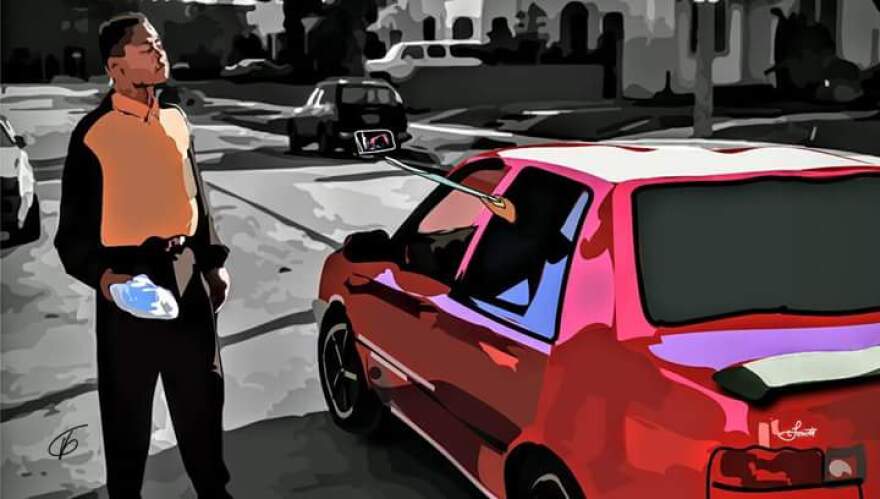For September's Art Hop, Kalamazoo artists Keyon Lovett and Alfield Reeves are coming together to show two very different aspects of the African American experience. Both might change the way you think about two everyday things - social media and hair.
Keyon Lovett is a painter, illustrator, and digital artist. In his part of the exhibit, Lovett recreates scenes from movies and puts them in a real-life, modern context.
He says he’s a big fan of Spike Lee - a director known for tackling tough issues like racism and urban violence. Lovett says unfortunately the problems that Lee was talking about almost 30 years ago are still here today.
So how do you make something old seem new? Through social media, of course. For one of his works, Lovett drew a scene from Boyz n the Hood - John Singleton's 1991 film about three young men navigating life in a Los Angeles ghetto. It shows the character Doughboy as a kid getting arrested for stealing candy from a store. Only Lovett captures it through the lens of the Instagram app.
“What would that look like in 2016? That would definitely be a newsfeed on Facebook, Instagram, Twitter," he says.

"I don’t know if Doughboy probably would have been alive. I mean we’ve seen kids get shot for less. I mean so I thought that was interesting to depict that in today’s time. This is still happening.”
In another work, Lovett recalls the time in Boyz n the Hood where bullies pull up alongside the character Trey and threaten him with a shotgun. In his art, Lovett replaced the shotgun with a selfie stick. He calls it “Torment”:
“We can easily go on Facebook or Instagram and see somebody flashing money, right? See somebody saying that my life is better than yours, right? You know I just got some new Jordans and you don’t. My clothes are better than yours or my house is better than yours. My money is larger than yours. You know anything. I just take that as…it’s tormenting.”

Photographer Alfield Reeves is partnering with Lovett on the Art Hop display.
In his photo series, Reeves captured black women in Southwest Michigan wearing natural hairstyles. “Natural” in this case meaning hair that hasn’t been permed or relaxed with chemical straighteners.
Western Michigan University senior Tirrea Billings is one of the models in Reeves’ series. She went natural two years ago.
“I just loved being around other women that embraced their natural hair and just having different conversations about the movement itself and why it’s important and why we should teach youth and the younger girls to love their natural hair at a young age,” she says.
Billings says she was taught that natural hair was “ugly.”
“So I just kind of grew up with that mindset that if I had nappy, natural hair that it wasn’t you know, it was looked at as unkempt and not clean. So it’s definitely interesting to see how that perspective has changed,” says Billings.
Yes, racism in the United States extends all the way to hair. For centuries, white people made it clear that natural black hair was not allowed in white society. Women especially were forced to use harsh chemicals that might even make hair fall out to achieve a look that was considered acceptable.

That made wearing natural hair an act of defiance. The Black Power movement of the 1960s and 70s made a point of embracing natural hair - with styles like the classic afro.
Billings says now there’s a new wave of the natural hair movement going on - but it’s more about personal choice.
“Like it’s ok to perm your hair if that’s what you want to do, if that’s what makes you feel comfortable by all means you can do that," she says.
"But at the same time the natural hair movement just kind of highlights that you don’t have to have permed hair to be considered beautiful.”
Artists Alfield Reeves and Keyon Lovett will have their work on display at the Black Arts & Cultural Center as part of September's Kalamazoo Art Hop.




